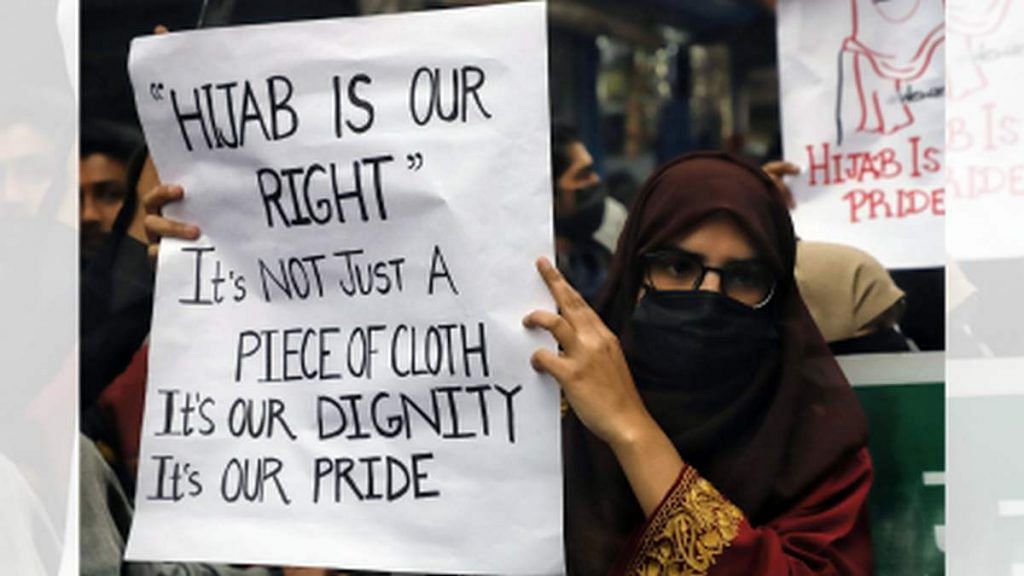New Delhi: If wearing a hijab is accepted as essential to Islamic religious practice, it could end up violating the right of Muslim women not to wear one, the Karnataka government said Tuesday.
Advocate General (AG) Prabhuling Navadgi submitted before a three-judge Karnataka High Court bench, headed by Chief Justice Ritu Raj Awasthi, that as soon as the hijab “becomes a religious sanction”, it will be “compulsory” for Muslim women to wear one.
The AG also cited the 2018 Supreme Court verdict in the Sabarimala Temple case to support his argument that declaring the hijab essential to religious practice could compromise the “dignity of women” and their freedom of choice. He further quoted from the song ‘Na Munh Chhupa Ke Jiyo (Don’t Hide Your Face)’ from the 1967 film Hamraaz to drive home his point.
The high court bench is currently hearing a set of petitions challenging a 4 February government order that obliquely backed a ban on hijabs prescribed by a government college. The order had stated that students should avoid wearing “clothes which disturb equality, integrity and public law and order”.
The petitioners are seeking a declaration from the court that wearing the hijab should be treated as an essential religious practice and, therefore, protected under Article 25 of the Constitution, which pertains to freedom to profess, practise, and propagate religion.
Also Read: Viral photos, bruised egos, radical student groups: Inside story of Karnataka’s hijab crisis
Sabarimala case highlights ‘individual dignity’ vs religious sanction
The Advocate General cited the Supreme Court verdict in the Sabarimala case to argue against declaring the hijab essential to religious practice.
The SC verdict, in 2018, had deemed that banning women between the ages of 10 and 50 from entering the Sabarimala Temple in Kerala was not an essential religious practice and that women of all ages should be free to enter and worship.
“It (petition) has to be seen in the light of the law laid down by the SC in the Sabarimala case. Is it possible to accept the concept of hijab on the aspect of constitutional morality and an individual’s dignity?” the AG argued, adding that the court must consider women’s freedom of choice.
“A declaration will enable imposition and, with this, the element of choice goes away. As soon as it (hijab) becomes a religious sanction, the woman will become obligated by way of religious sanction to wear a particular dress. It becomes compulsory for her,” the AG said.
The AG quoted portions of the Supreme Court judgment in the Sabarimala case, particularly the opinion of Justice D.Y. Chandrachud, to emphasise the principle of “individual dignity”. According to him, a woman who chose not to wear a hijab might be “castigated” if it were declared that the headscarf was essential to Islamic practice.
The petitioners in the case have argued that wearing the hijab is not only constitutionally protected under Article 25, but also under Article 19 (1)(a), which pertains to freedom of speech and expression.
According to the AG, however, the claims of essential religious practice and freedom of speech and expression are “mutually destructive”.
“Under Article 19 (1)(a), there is an element of option, which can be exercised under this provision. But under Article 25, when it comes to wearing a dress, there is an element of compulsion,” he said.
Moreover, he added, if the argument for Article 19(1)(a) is accepted, then the state can impose “reasonable restrictions” under Article 19(2) for public order, morality, and health.
In the present case, he further explained, the existence of a dress code placed reasonable restrictions as part of institutional discipline.
“There is no restriction on wearing hijab in this country, but it can be prohibited to apply institutional discipline. In this case, there is no restriction to wear hijab inside the premises of the institution, but only inside the classroom and during the class… it applies to all students irrespective of their class and communities,” he submitted.
The AG went on to clarify that the state was not enforcing any rules on private unaided minority institutions and has left it to their discretion to prescribe uniforms for their students.
On Wednesday, submissions in the court will be made on behalf of PU Government College in Udupi, where the row over the right to wear the hijab originated in December 2021.
(Edited by Asavari Singh)
Also Read: Amidst ongoing Hijab row, ‘murder’ of Bajrang Dal activist creates further tension in Karnataka
